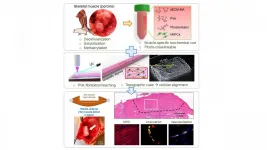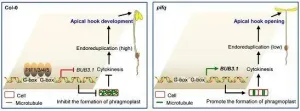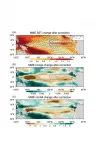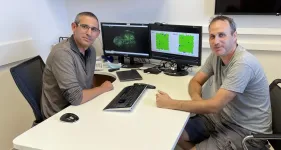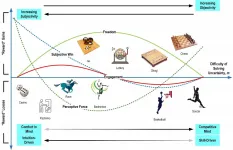(Press-News.org) PITTSBURGH, May 11, 2021 - Patients with clinically diagnosed neurological symptoms associated with COVID-19 are six times more likely to die in the hospital than those without the neurological complications, according to an interim analysis from the Global Consortium Study of Neurologic Dysfunction in COVID-19 (GCS-NeuroCOVID).
A paper published today in JAMA Network Open presents early results of the global effort to gather information about the incidence, severity and outcomes of neurological manifestations of COVID-19 disease.
"Very early on in the pandemic, it became apparent that a good number of people who were sick enough to be hospitalized also develop neurological problems," said lead author Sherry Chou, M.D., M.Sc., principal investigator of the consortium and associate professor of critical care medicine, neurology, and neurosurgery at the University of Pittsburgh School of Medicine and UPMC. "A year later, we are still fighting an unknown invisible enemy and, like in any battle, we need intel--we have to learn as much as we can about neurological impacts of COVID-19 in patients who are actively sick and in survivors."
The GCS-NeuroCOVID is the largest cohort study of neurological manifestations of COVID-19 to date, spanning 133 adult patient sites in all continents except Antarctica.
Among one group of 3,744 hospitalized adult patients with COVID-19, 82% had self-reported or clinically captured neurological symptoms. Nearly 4 out of 10 patients reported having headaches, and approximately 3 out of 10 said they lost their sense of smell or taste. Of the clinically diagnosed syndromes--abnormalities that a bedside clinician can observe, regardless of whether the patient is aware of the problem--acute encephalopathy was most common, affecting nearly half of the patients, followed by coma (17%) and strokes (6%).
Despite early concerns about the coronavirus's ability to directly attack the brain and cause brain swelling and inflammation--meningitis and encephalitis--those events were very rare, occurring in less than 1% of hospitalized COVID-19 patients.
"Acute encephalopathy is by far the most common symptom that we see in the clinic," said Chou, also associate director of the Pitt Safar Center for Resuscitation Research. "Those patients may be in an altered sensory state or have impaired consciousness, or they don't feel like themselves and act confused, delirious or agitated."
The researchers analyzed data from three different types of patient cohorts--the "all COVID-19" cohort, which included all 3,055 hospitalized patients with COVID-19, irrespective of their neurological status; the "neurological" cohort, which included 475 hospitalized COVID-19 patients with clinically confirmed neurological symptoms compiled by the GCS-NeuroCOVID Consortium; and the "ENERGY" cohort, or 214 hospitalized COVID-19 patients who required evaluation by a consulting neurologist and provided consent to participate in the European Academy of Neurology Neuro-COVID Registry (ENERGY), a formal partner of the GCS-NeuroCOVID Consortium.
The study found that having a preexisting neurological condition of any kind--from brain, spinal cord and nerve diseases to chronic migraines, dementia or Alzheimer's disease, among others--is the strongest predictor of developing COVID-19-related neurological complications, increasing the risk by two-fold. In addition, having any neurological symptoms related to COVID-19--from something as seemingly innocuous as the loss of smell to major events like strokes--is associated with a six-fold higher risk of dying.
But even if a patient beats the odds and recovers, their long-term health outlook is still uncertain.
"Even if the pandemic is completely eradicated, we are still talking about millions of survivors who need our help," said Chou. "It is important to find out what symptoms and health problems those patients are facing, and there is still plenty of work for years to come."
INFORMATION:
Additional authors of the study include Valeria Altamirano, M.S., of Pitt; Ettore Beghi, M.D., of Istituto di Ricerche Farmacologiche Mario Negri IRCCS, Milan, Italy; Raimund Helbok, M.D., of Medical University of Innsbruck, Austria; Elena Moro, M.D., Ph.D., of Grenoble Institute of Neuroscience, France; Joshua Sampson, Ph.D., of the National Cancer Institute, Baltimore; Shraddha Mainali, M.D., and Molly McNett, Ph.D., of The Ohio State University, Columbus, Ohio; Claudio Bassetti, M.D., of University of Bern, Switzerland; Jose Suarez, M.D., of the Johns Hopkins University School of Medicine, Baltimore; and other GCS-NeuroCOVID Consortium and ENERGY Consortium members. The GCS-NeuroCOVID consortium is endorsed by the Neurocritical Care Society.
Authors thank the research team at the Pitt School of Medicine, including the GCS-NeuroCOVID Consortium coordinator Ali Scott-Smith, volunteer Pitt neurology residents, Pitt medical students and undergrad students.
This research was supported by the National Institutes of Health (grant R21NS113037), National Center for Advancing Translational Sciences (grant UL1TR001857) and the University of Pittsburgh Dean's Faculty Advancement Award.
To read this release online or share it, visit https://www.upmc.com/media/news/051121-chou-neurocovid [when embargo lifts].
About the University of Pittsburgh School of Medicine
As one of the nation's leading academic centers for biomedical research, the University of Pittsburgh School of Medicine integrates advanced technology with basic science across a broad range of disciplines in a continuous quest to harness the power of new knowledge and improve the human condition. Driven mainly by the School of Medicine and its affiliates, Pitt has ranked among the top 10 recipients of funding from the National Institutes of Health since 1998. In rankings recently released by the National Science Foundation, Pitt ranked fifth among all American universities in total federal science and engineering research and development support.
Likewise, the School of Medicine is equally committed to advancing the quality and strength of its medical and graduate education programs, for which it is recognized as an innovative leader, and to training highly skilled, compassionate clinicians and creative scientists well-equipped to engage in world-class research. The School of Medicine is the academic partner of UPMC, which has collaborated with the University to raise the standard of medical excellence in Pittsburgh and to position health care as a driving force behind the region's economy. For more information about the School of Medicine, see http://www.medschool.pitt.edu.
http://www.upmc.com/media
Contact: Anastasia Gorelova
Mobile: 412-491-9411
E-mail: GorelovaA@upmc.edu
Contact: Allison Hydzik
Mobile: 412-559-2431
E-mail: HydzikAM@upmc.edu
What The Study Did: This global observational study included patients with COVID-19 representing 13 countries and four continents, and its findings suggest neurological manifestations are prevalent among patients hospitalized with COVID-19 and associated with higher in-hospital death.
Authors: Sherry H-Y. Chou, M.D., M.Sc., of the University of Pittsburgh School of Medicine, is the corresponding author.
To access the embargoed study: Visit our For The Media website at this link https://media.jamanetwork.com/
(doi:10.1001/jamanetworkopen.2021.12131)
Editor's Note: The article includes conflict of interest and funding/support disclosures. Please see the article for additional information, ...
Furthering efforts to understand why potentially life-saving statins are so under-prescribed among American patients with heart disease, a new study shows that clinicians are more likely to sign a script for them earlier in the day. The new study by researchers in Penn Medicine's Nudge Unit found that patients with the very first appointments of the day were most likely to have statins prescribed, and the odds progressively fell through the morning and remained low throughout the afternoon. The study was published today in JAMA Network Open.
In recent years, researchers ...
WASHINGTON, May 11, 2021 -- When trauma, illness, or injury causes significant muscle loss, reconstructive procedures for bioengineering functional skeletal muscles can fall short, resulting in permanent impairments.
Finding a synergy in the importance of biochemical signals and topographical cues, researchers from Wake Forest Institute for Regenerative Medicine, Sungkyunkwan University, and Chonnam National University developed an efficient technique for muscle regeneration and functional restoration in injured rats. They describe results from the technique in the journal Applied Physics Reviews, from AIP Publishing.
The group expanded on a method they previously developed using muscle-specific materials derived from ...
To protect their newly formed fragile organs, dark-grown dicotyledonous plants form an apical hook when penetrating through the soil. The apical hook of pifq (pif1 pif3 pif4 pif5) mutant was fully opened, even in complete darkness, suggesting that PIF proteins are required for maintaining the apical hook in the darkness and are involved in regulation of the apical hook opening. But the underlying mechanism for PIF proteins mediated apical hook development remains elusive.
To better understand how PIF proteins affect apical hook development, scientists from the Institute of Botany of the Chinese Academy of Sciences recently investigated their roles ...
The Saker Falcon (Falco cherrug) is a bird of prey living in plains and forest-steppes in the West and semi-desert montane plateaus and cliffs in the East. The majority of its Central and Eastern European population is migratory and spends winters in the Mediterranean, the Near East and East Africa. With its global population estimated at 6,100-14,900 breeding pairs, the species is considered endangered according to the IUCN Red List.
In Bulgaria, the Saker Falcon, considered extinct as a breeding species since the early 2000s, was recovered in 2018 with the discovery of the first active nest from its new history in Bulgaria. The nest is built by two birds that were reintroduced back in 2015 as part of the first ever Saker Falcon reintroduction programme. The results of the 5-year programme ...
Northern Chile is an ideal natural laboratory to study the origin of earthquakes. Here, the Pacific Nazca plate slides underneath the South American continental plate with a speed of about 65 millimetres per year. This process, known as subduction, creates strain between the two plates and scientists thus expected a mega-earthquake here sooner or later, like the last one in 1877. But although northern Chile is one of the focal points of global earthquake research, until now there was no comprehensive data set on the structure of the marine subsurface - until nature itself stepped in to help.
On 1 April 2014, a segment of the subduction zone ...
St. Petersburg, like other cities in the Russian Federation, is actively participating in the establishment of the "Smart City" program, which will provide new services for residents of the megalopolis, increasing the safety of citizens. Digital services are essential for such a system.
Due to the Internet of Things (IoT) systems, the environment can adapt to the needs of humanity on its own accord. Cybersecurity threats are especially dangerous for such infrastructure.
Specialists from Peter the Great St.Petersburg Polytechnic University (SPbPU) developed the methodology for assessing cyber risks in intelligent systems of a Smart City. The developed methodology was tested on the "smart crossroads" ...
A reliable projection of extreme El Niño frequency change in future warmer climate is critical to managing socio-economic activities and human health, strategic policy decisions, environmental and ecosystem managements, and disaster mitigations in many parts of the world. Unfortunately, long-standing common biases in CMIP5 models, despite enormous efforts on the numerical model development over the past decades, make it hard to achieve a reliable projection of the extreme El Niño frequency change in the future. While increasing attentions have been paid to estimate possible impacts of models' biases, it is not yet fully understood whether and how much models' common biases would impact the projection ...
Using Zebrafish, researchers from the School of Neurobiology, Biochemistry and Biophysics at the Faculty of Life Sciences of Tel Aviv University have developed an advanced simulation of a key process in the brain - the activation of the stem cells responsible for generating neurons. The simulation revealed that the process, which until today was considered to be random, is in fact coordinated, thereby ensuring the normal production of neurons in the brain. According to the researchers, their findings add another layer of understanding to brain development, ...
Ishikawa, Japan - History tells us that games are an inseparable facet of humanity, and mainly for good reasons. Advocates of video games laud their pros: they help develop problem-solving skills, socialize, relieve stress, and exercise the mind and body--all at the same time! However, games also have a dark side: the potential for addiction. The explosive growth of the video game industry has spawned all sorts of games targeting different groups of people. This includes digital adaptations of popular board games like chess, but also extends to gambling-type games like online casinos and betting on ...

